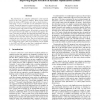Free Online Productivity Tools
i2Speak
i2Symbol
i2OCR
iTex2Img
iWeb2Print
iWeb2Shot
i2Type
iPdf2Split
iPdf2Merge
i2Bopomofo
i2Arabic
i2Style
i2Image
i2PDF
iLatex2Rtf
Sci2ools
103
click to vote
MICRO
2005
IEEE
2005
IEEE
Improving Region Selection in Dynamic Optimization Systems
The performance of a dynamic optimization system depends heavily on the code it selects to optimize. Many current systems follow the design of HP Dynamo and select a single interprocedural path, or trace, as the unit of code optimization and code caching. Though this approach to region selection has worked well in practice, we show that it is possible to adapt this basic approach to produce regions with greater locality, less needless code duplication, and fewer profiling counters. In particular, we propose two new region-selection algorithms and evaluate them against Dynamo’s selection mechanism, Next-Executing Tail (NET). Our first algorithm, Last-Executed Iteration (LEI), identifies cyclic paths of execution better than NET, improving locality of execution while reducing the size of the code cache. Our second algorithm allows overlapping traces of similar execution frequency to be combined into a single large region. This second technique can be applied to both NET and LEI, an...
Related Content
| Added | 25 Jun 2010 |
| Updated | 25 Jun 2010 |
| Type | Conference |
| Year | 2005 |
| Where | MICRO |
| Authors | David Hiniker, Kim M. Hazelwood, Michael D. Smith |
Comments (0)

